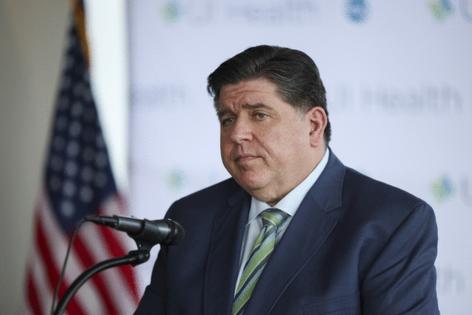Illinois looks to rein in drug intermediaries over high costs, but legislation is unresolved and industry says the efforts are flawed
Published in News & Features
New patients have recently begun streaming into Del-Kar Pharmacy — an independent, 65-year-old drugstore in North Lawndale — after nearby Walgreens stores closed.
The new customers would be a blessing for many businesses, but for Del-Kar it means losing money on many prescriptions. The reimbursements the drugstore receives for filling orders are often less than the cost of filling them, said second-generation owner and pharmacist Edwin Muldrow.
He traces the trend to the rise of pharmacy benefit managers, or PBMs — companies that act as intermediaries among drugmakers, insurance corporations and pharmacies.
Independent pharmacy owners have long complained that PBMs are part of massive conglomerates that have led to higher out-of-pocket costs for patients. They say PBMs steer patients to pharmacies in which they have a financial interest, don’t reimburse pharmacies enough for medications and don’t adequately pass along rebates they get from drugmakers.
“What the PBMs have done to our profession, it’s wrong, it’s criminal, it’s unfair, and I just don’t understand why they have to take such extreme measures to compete with us little men and women,” Muldrow said.
After years of outcry, Gov. JB Pritzker has thrown his support behind efforts to require PBMs to change how they do business in Illinois. Pritzker has called for legislation that would prevent PBMs from directing patients to pharmacies where they have a financial interest, bar them from pocketing certain savings on medications and require them to open their books to state regulators, among other changes.
Pritzker said in his State of the State address in February that PBMs “extract extra profit from patients through opaque and often predatory tactics.”
“They are not doctors, but they work with insurance companies to deny people the drugs and treatments doctors prescribe,” Pritzker said. “Not only are they driving up health care costs for Illinois families by hundreds of millions of dollars per year, but they are also putting small, local, independent pharmacies out of business.”
PBM backers, however, say the governor’s plans are flawed and argue that they aren’t to blame for high drug prices. Rather, PBM supporters say, they save patients and employers money partly by negotiating with drugmakers and then passing on those savings.
“PBMs are the only check against drug companies’ unlimited pricing power,” the Pharmaceutical Care Management Association, which represents PBMs, said in a statement. “Health plans rely on PBMs to administer pharmacy benefits that are affordable and meet the health needs of patients. Undermining and weakening our ability to lower drug costs will lead to higher drug costs in Illinois.”
Nevertheless, the industry is drawing the ire of leaders across the political spectrum — a rare issue on which there appears to be at least some agreement between Illinois’ Democratic governor and his favorite political target, Republican President Donald Trump. The White House last week issued an executive order that aims to lower drug prices through steps that would include increasing “transparency into the direct and indirect compensation received by pharmacy benefit managers.”
Despite Pritzker making the issue a top priority for the spring legislative session, his allies in Springfield have yet to introduce a formal proposal. Closed-door negotiations are ongoing, but key Democratic lawmakers said the involvement of the governor’s office should make the difference in getting a measure passed before the General Assembly’s scheduled May 31 adjournment.
“I expect we will pass the bill, I just don’t know exactly when,” Pritzker told the Tribune in a brief interview last week. Lawmakers and the governor remained tight-lipped, however, about whether whatever legislation emerges from those discussions would achieve all the goals Pritzker outlined earlier this year.
Working behind the scenes
PBMs began providing services in the 1960s, but it wasn’t until recently that their power really grew, according to a Federal Trade Commission staff report.
Though many would be hard-pressed to explain what PBMs actually do, the companies have come to play an increasingly large role in how people receive and pay for their medications. The three largest PBMs processed nearly 80% of prescriptions dispensed by U.S. pharmacies in 2023, according to the FTC report.
In a nutshell, PBMs work behind the scenes, administering prescription drug benefits for health insurers, employers, labor unions and state and federal government health programs.
The crux of the debate over PBMs is whether they are saving consumers money or contributing to higher out-of-pocket costs for patients and the demise of some pharmacies.
PBMs have taken on a number of jobs. For one, they work with insurers and employers to help them decide medication coverage by devising formularies, which are lists specifying the prescription medications health plans cover and how the costs will be divided between the plans and patients. Employers and health insurers can choose which formulary options to use.
PBMs also negotiate with drugmakers to get rebates on medications in exchange for those drugs getting good formulary placement. In 2016 PBMs passed along 91% of drug manufacturers’ rebates to their customers — namely employers and health plans — according to a report by the Pew Charitable Trusts.
And PBMs contract with pharmacies to create networks in which insured patients can fill their prescriptions. As part of these arrangements, pharmacies may accept lower reimbursement rates in exchange for being part of a PBM’s preferred network, according to the FTC report.
The three largest PBMs are part of much bigger companies that are all listed among the largest 40 companies in the world, according to Fortune. CVS Health, for instance, owns PBM CVS Caremark, while Cigna owns the PBM Express Scripts and PBM Optum Rx is part of UnitedHealth Group.
It’s a structure many have criticized.
“The way the system works now is not a very well-functioning system,” said state Sen. Dave Koehler, a Peoria Democrat who has been pushing legislation for several years to bring more regulation to the industry. “There’s just too many places to extract money out of the system. It really ought to be between a doctor writing a script and a patient standing in front of the pharmacy counter, in my estimation.”
The Pharmaceutical Research and Manufacturers of America, the drugmaker industry group better known as PhRMA, says health insurers and PBMs get billions of dollars in rebates and discounts that can bring down the cost of certain medications by 50% or more but that they often make patients pay based on the full price.
States can pass legislation that would require PBMs to share the rebates and discounts they get from drugmakers with patients, Stami Turk, a PhRMA spokesperson, said in a statement.
“Fixing this part of the system and sharing the savings with patients would provide immediate relief and help Illinois patients better afford the medicines they need,” Turk said in the statement.
‘We bring options’
Critics also say PBMs engage in “spread pricing,” which is when they charge a health insurer or employer more for a medication than they pay a pharmacy for it — keeping the difference. And they say PBMs steer patients to pharmacies in which they have a financial interest.
PBMs, however, say spread pricing can help save money for health plans and employers. With spread pricing, the employer or health plan pays a set price for a drug and if the pharmacy’s reimbursement rate for that drug is higher than that amount, the PBM absorbs that cost, the Pharmaceutical Care Management Association said in its statement.
Ed DeVaney, president of PBM CVS Caremark, also said that using networks with fewer pharmacies is a option PBMs offer as a way that employers, unions and others who pay for health insurance can keep costs down.
“We bring options, and the employers and unions are the ultimate parties that choose how they want to do it,” DeVaney said. An unintended consequence of proposals like the ones being considered in Illinois is that they can mean fewer options for employers looking to hold down costs, he said.
“We want to work with (the governor) to ensure any proposal that advances that truly lowers cost for consumers does not burden public purchasers and private employers with higher costs,” DeVaney said.
Many are agitating for reforms at the state and federal levels. Illinois Attorney General Kwame Raoul recently joined 38 other attorneys general in sending a letter to congressional leaders asking them to pass a law prohibiting PBMs from owning or operating pharmacies.
Last week, in another sign of how the PBM issue has riled up both Democrats and Republicans, Arkansas became the first state to bar PBMs from owning pharmacies through a measure signed into law by Republican Gov. Sarah Huckabee Sanders, Trump’s former press secretary and close political ally.
Also, the FTC filed an administrative complaint against the three biggest PBMs in September, alleging they engaged in anticompetitive and unfair practices that artificially inflated the list price of insulin drugs. The FTC alleged that even when cheaper insulin products became available, the PBMs favored coverage for higher-priced insulin made by drugmakers that gave high rebates to the PBMs.
The Pharmaceutical Care Management Association said at the time that the average out-of-pocket cost for insulin has actually declined in recent years and, “The FTC’s action ignores significant progress PBMs have made lowering costs in the insulin market.”
That legal action was paused following upheaval among the FTC commissioners after Trump took office.
Trump’s recent executive order may raise hope for action at the federal level to bring down drug prices, but critics remain skeptical.
Among other issues, Pritzker spokesman Alex Gough pointed to the Trump administration’s reported steps toward imposing cost-raising tariffs on drug imports, while a memo prepared by top state health officials notes that the president backed off of tougher regulations on PBMs during his first presidency under pressure from industry lobbyists.
“We will not believe their false promises and instead stay focused doing everything we can at the state level to help families afford health care and prescriptions,” Gough said in a statement.
State Rep. Natalie Manley, a Joliet Democrat who is expected to sponsor Pritzker’s proposal in the Illinois House, said she’s hopeful the federal government will take action but “won’t hold my breath.”
“I think we need to be out in front of it and do the work that’s involved in getting this done,” Manley said. “Protecting the people here in Illinois, that’s our job.”
Independent pharmacies feel squeezed
Many Illinois pharmacists say the practices of PBMs have made it difficult to stay in business.
“They’re just middlemen. They don’t care for any patients. They don’t dispense prescriptions except at pharmacies they own,” said Michelle Dyer, who owned three pharmacies in central Illinois. “All they do is take money out.”
Dyer bought the three pharmacies in rural Carlinville, Gillespie and Bunker Hill in 2008, 2009 and 2016, respectively.
For a time, business went well. But then certain PBM fees began to soar and reimbursements for medications dropped, she said.
She said it costs pharmacies $12, on average, to fill a prescription, including the costs of paying employees, rent and utilities. For some medications, she’d get reimbursed only 50 cents, she said, which “doesn’t even cover the cost of my vial.”
In 2022 Dyer closed two of her pharmacies. She closed the remaining one earlier this year.
“You try to tighten your belt, you try to see what you can do to streamline your services, but it was just a losing battle,” Dyer said. “As an independent pharmacy, as a small-business owner, you just don’t have the power to deal with any of it.”
But DeVaney, with CVS Caremark, said independent pharmacies are often reimbursed more for medications than chain pharmacies because of Medicare and Medicaid rules that require PBMs to have a sufficient number of independent pharmacies in their networks. CVS Caremark said it reimburses Illinois independent pharmacies, on average, 42% more than it reimburses CVS pharmacies.
Still, pharmacies continue to close. Nationally, more than 29% of retail pharmacies that were operating from 2010 to 2020 had closed by 2021, according to a study published in the journal Health Affairs last year. Many other pharmacies opened to replace them during that time, though not necessarily in the same neighborhoods, according to the study.
That study found that independent pharmacies were at greater risk for closure than chain pharmacies during that time, though the number of independent pharmacies grew slightly from 2018 to 2021 while the number of chain pharmacies declined 5%.
Such closures can make life more difficult for patients, especially those living in areas with few pharmacies.
After Dyer’s pharmacies closed, she said, one of her former customers told her it took him two days to get an important medication filled at a chain pharmacy. She heard that another customer simply stopped taking his medications for a time after one of her pharmacies closed.
It’s not just small, independent pharmacies that are closing. Walgreens has been struggling for years, for a number of reasons including challenges related to reimbursements for medications. The retail pharmacy giant announced last year that it planned to close 1,200 of its stores across the country over three years, including in Illinois.
“We don’t want that to happen,” said Koehler, the Peoria Democrat. “So we’re trying to find out a way that we can help some of the distressed communities maintain adequate coverage in terms of their pharmacy needs.”
Amid its troubles, Walgreens recently announced it was being sold to private equity. Walgreens does not have its own PBM.
Keeping costs down for patients
Advocates hope the legislation in the works in Springfield would not only help pharmacies stay in business but also keep medication costs under control for patients.
Across the country, 14 states already limit the practice of spread pricing in the commercial insurance market, and 17 states limit the ability of PBMs to steer patients to certain pharmacies, according to the National Community Pharmacists Association.
“This legislation is important because patients and plan sponsors deserve to no longer be fooled and scammed by pharmacy benefit managers,” said Garth Reynolds, executive director of the Illinois Pharmacists Association. “They need to be able to have those maximum savings brought back to them at point of sale.”
Advocates say legislation coming out of Springfield could help patients like Lequita Michelle Mayhew, 60, of Bronzeville.
Mayhew has multiple sclerosis and used to receive a monthly infusion of a pricey medication that her insurance covered, she said. But a little more than a year ago, her doctor said she needed to switch medications for medical reasons. The new drug was still expensive, with a list price of nearly $78,000 a year, but it cost less than the first medication on an annual basis, Mayhew said.
Mayhew’s insurance would not cover the new drug, she said.
“I did research to find out, why would they cover a higher-price drug and not the lower-price drug? And that was due to the pharmacy benefit manager policies that they had in place,” Mayhew said.
Luckily, Mayhew said, she was able to ultimately get the cost covered, not by her insurer but by a patient assistance program offered by the drugmaker.
She said she doesn’t even want to think about what would have happened if she hadn’t found a way to cover the cost of the medication.
“If people are not getting the drugs they need, they get sick, or, they have to rob Peter to pay Paul to pay for their prescriptions and they can’t afford to eat and can’t afford to pay for their housing and their lifestyle,” Mayhew said. “If we cannot afford the medication we need we’re not going to have a good quality of life.”
_____
©2025 Chicago Tribune. Visit chicagotribune.com. Distributed by Tribune Content Agency, LLC.












Comments